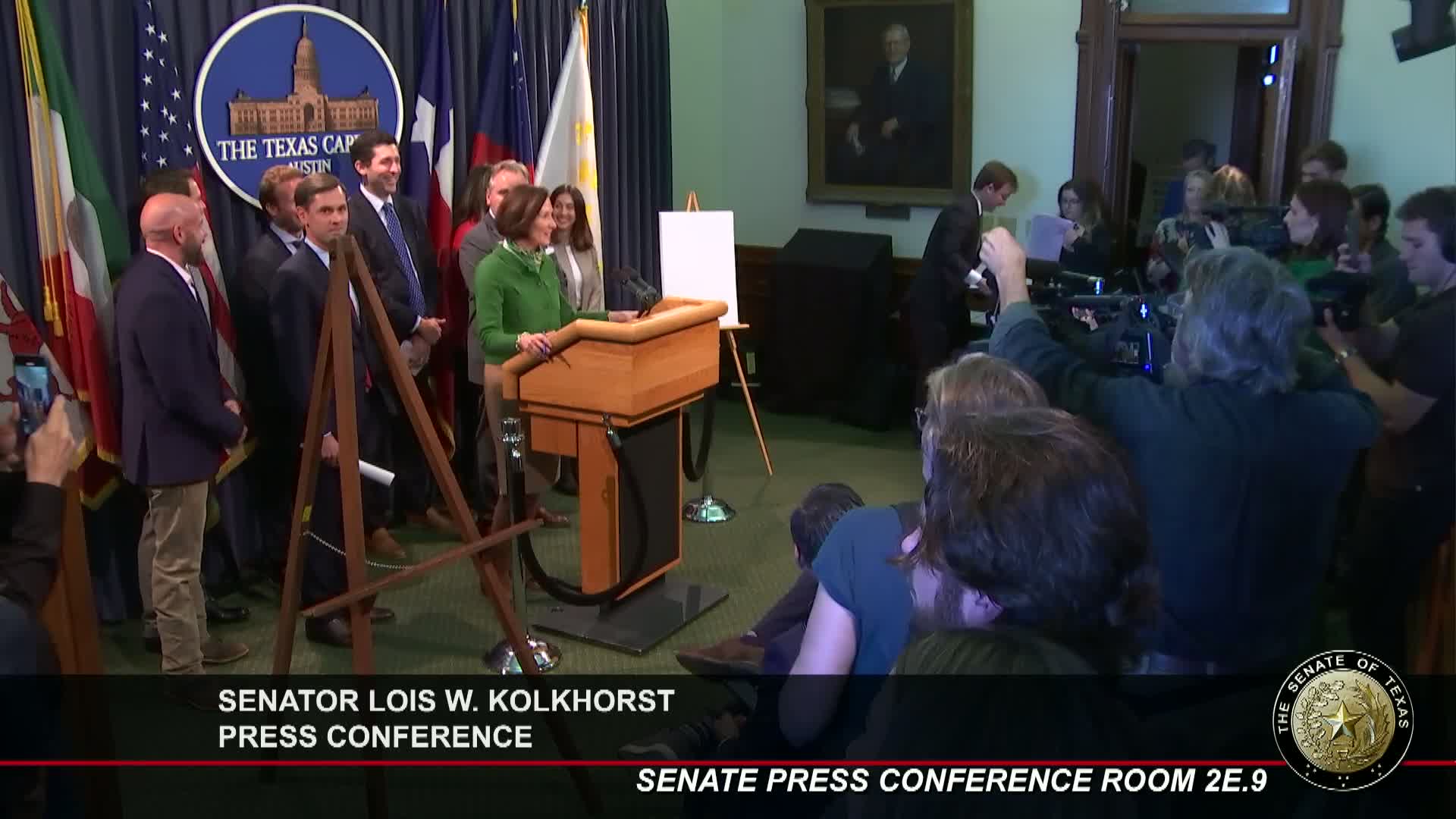Texas lawmakers unveil package to tighten school food standards, expand nutrition education and restrict junk food in SNAP
Get AI-powered insights, summaries, and transcripts
Subscribe
Summary
Chairwoman Kolkhorst, state senator and chair of the Senate Health and Human Services Committee, and sponsors on both sides of the Capitol held a press event in Austin to announce three related bills aimed at reducing chronic disease by changing school meals, expanding nutrition education and limiting taxpayer‑funded purchases of junk food.
Chairwoman Kolkhorst, state senator and chair of the Senate Health and Human Services Committee, and sponsors on both sides of the Capitol held a press event in Austin to announce three related bills aimed at reducing chronic disease by changing school meals, expanding nutrition education and limiting taxpayer-funded purchases of so‑called junk food. The proposals are Senate Bill 25, Senate Bill 314 and Senate Bill 379; committee hearings were announced for the immediate session.
The legislation is meant to address growing state and national concern about diet-related chronic illness. "We have to do this for our children," Chairwoman Kolkhorst said, outlining what she described as a four‑pillar plan in SB 25: expanded physical education requirements for children; required nutrition curriculum for medical students and continuing medical education for physicians; creation of a Texas Nutrition Advisory Committee to review scientific links between ultra‑processed foods and chronic disease; and new labeling requirements to inform consumers about ingredients that are not permitted or used in other Western countries.
Senator Hughes, who introduced SB 314, said the bill is targeted at school meals provided through the National School Lunch Program. "If an ingredient is linked to severe human harm, is unnecessary, and alternatives are available, state law will prohibit it from being served on that child's plate," Hughes said, adding the measure would affect "more than 3,000,000 students and over 8,000 schools." He said the list of restricted items has been expanded to include multiple synthetic food dyes and other substances.
Senator Mays Middleton described SB 379 as a change to how the Supplemental Nutrition Assistance Program (SNAP) can be used in Texas, removing "junk food" such as candy, chips and sugar‑sweetened beverages from eligible purchases. "Taxpayer‑funded junk food turns into taxpayer‑funded health care," Middleton said, arguing the change would better align SNAP with its nutrition and health purpose and, he said, would provide incentives for Texas producers and farmers.
National and industry figures at the event framed the effort as bipartisan and urgent. Cali Means, a co‑founder of the advocacy group TruMed and the coalition described in the event as Chronic Disease, said policymakers "are poisoning our kids through the incentives of our government programs, and then we are drugging them for profit." Jason Karp, identified as a Texas resident and food‑industry founder, cited an earlier demonstration comparing U.S. and foreign formulations of the same branded breakfast cereal to show differences in synthetic ingredients.
Speakers cited statistics from the Senate committee interim work and other sources: U.S. health‑care spending of roughly $4.5 trillion annually with a large share going to chronic and mental‑health conditions; that obesity affects about 20 percent of children and that roughly 73 percent of U.S. adults are overweight or obese; and that early‑onset cancers increased 79 percent between 1990 and 2019. Senator Kolkhorst said the proposals respond to those trends and to an executive effort she identified as the "Make America Healthy Again Commission."
During a question‑and‑answer period, a reporter asked how the proposals would reach rural areas and communities that face food‑access challenges. Kolkhorst said sponsors view the SNAP change and other incentives as potentially expanding market opportunities for local producers and improving access to fresh foods in rural parts of the state. An event participant noted that the WIC program already prohibits some items targeted by the bills and that the state already incentivizes fruits and vegetables through sales‑tax policy.
The bills were described as introductory policy moves; the press event did not record any formal votes or final actions. Organizers said committee hearings were scheduled and that further details — including proposed lists of banned ingredients, labeling language and implementation mechanisms for SNAP changes — would be discussed at the hearing.
Supporters said the measures are intended to be educational and preventive rather than punitive; opponents and hunger‑advocacy groups were expected to appear at hearings, according to statements at the event. No final committee decisions were made at the event itself.
The sponsors and advocates said hearings will take place in the coming days and that staff will provide bill text and technical details at that time.
